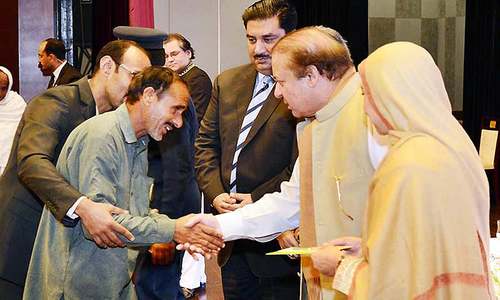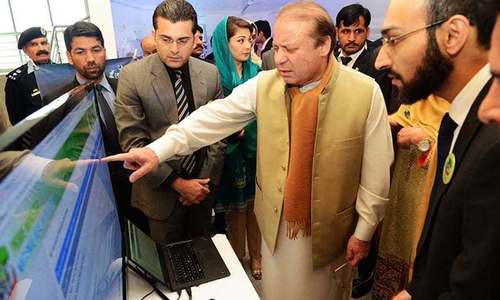With the PML-N government stepping up its campaigning efforts for the 2018 General Election, the party introduced the Prime Minister's National Health Programme in Narowal.
The scheme was first launched in Rahim Yar Khan, Punjab.
Prime Minister Nawaz Sharif announced on the occasion that around 160,000 families in Narowal will receive a health card under the scheme.
"People do not have enough money to buy medicine. They don't even have enough money to travel to the hospital. I would wonder how they are managing," he said, adding that the real duty of political workers is to serve the people of Pakistan.
Read more: Health cards will not end Pakistan's healthcare nightmare
"The government will cover medical bills (per card per family) that amount to more than Rs250,000. If it exceeds that limit, the treasury will chip in," the PM added.
Treatments for cardiovascular diseases — such as bypass surgeries or angioplasty treatments — as well as other complicated and expensive treatments are included in the scheme, he said.
Salient features of the PM's National Health Programme
- Treatment for the underprivileged at both public and private hospitals without delay
- Rs50,000 on PM's cards for treatment of common illnesses
- Rs300,000 set aside for treatment of serious medical conditions
- Limit can be extended to Rs600,000 if funds run out during treatment at a hospital
- Toll-free number set up for registering patients' complaints
Minister of National Health Services Regulation and Coordination Saira Afzal Tarar termed it a 'pro-women' programme.
Read more: Caesarian deliveries to be discouraged under national health programme
"Health is a devolved subject and it is in the care of the provinces, but no prime minister has done more for health than Prime Minister Nawaz Sharif," she said.
"People are saying we are just electioneering. But please do not put [unncessary] obstacles in our programme because remember, you have to contest in elections too," Tarar said.
Minister of Planning and Development of Pakistan Ahsan Iqbal, while addressing the audience, said back in 2013, Pakistan's economy was struggling.
"Five years later, under the PML-N government, a prestigious news outlet like The Economist has ranked Pakistan as one of the top-five fastest-growing economies in the world," Iqbal added.
"This scheme is benefiting the poorest of the poor. A labourer, a widow — who could only wish for the same treatment the privileged receive at hospitals — will now have the same access thanks to this programme," he said.
The initiative was initially launched in Islamabad, but was planned to be expanded to all parts of Punjab, Balochistan and the Federally Administered Tribal Areas (Fata) in later stages.
The programme targets the most vulnerable segments of the population, especially those who earn as low as Rs200 per day.
Sindh and Khyber Pakhtunkhwa will not benefit from the initiative because their governments have declined to become part of the federal government programme.













































